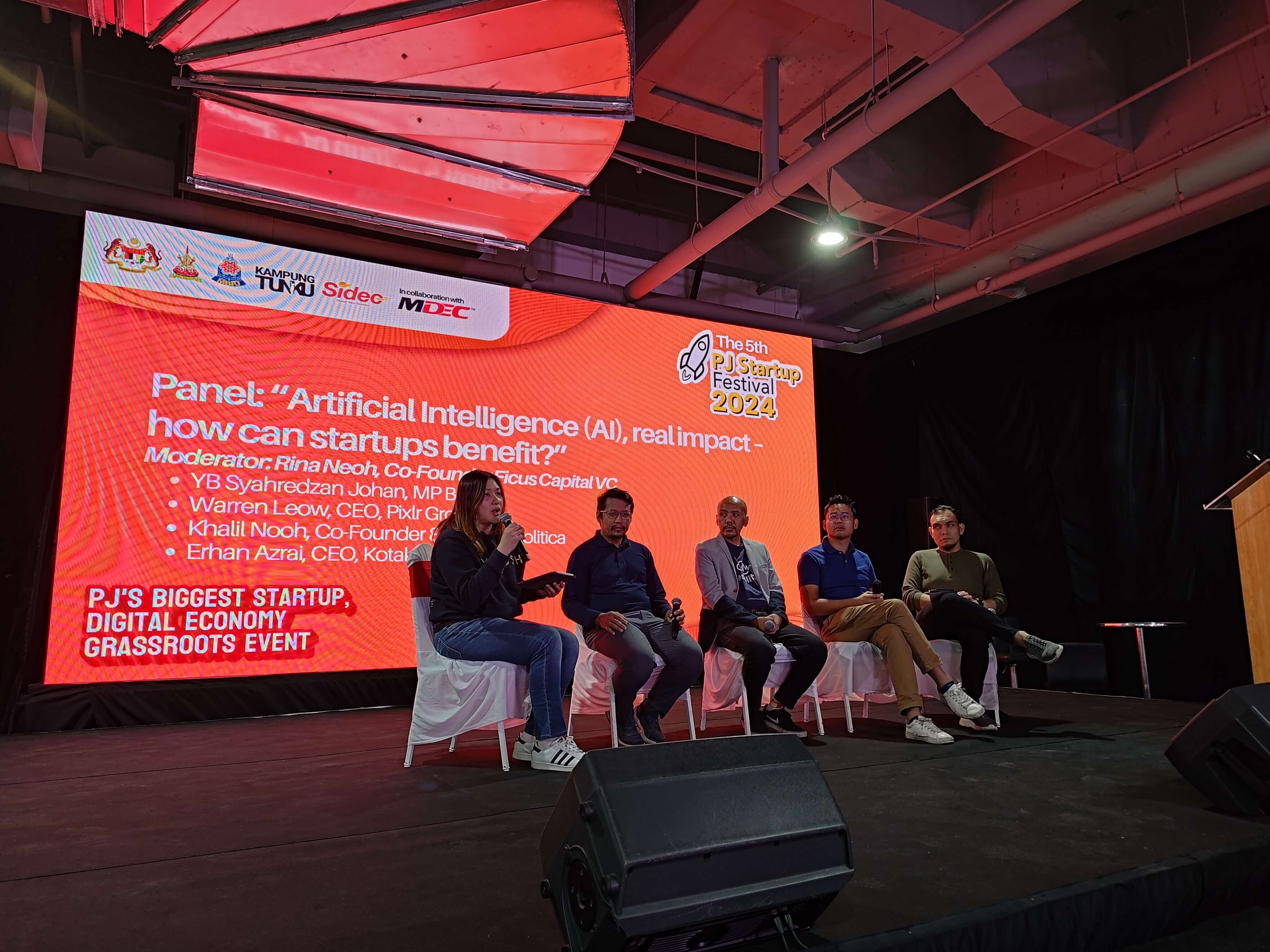Insights from the PJ Startup Festival 2024: Navigating the AI Landscape for Startups
Introduction
On Sunday, August 18, 2024, I had the opportunity to attend the 5th PJ Startup Festival, an event celebrating grassroots initiatives for startups and the digital economy in Petaling Jaya. The festival brought together entrepreneurs, investors, and tech enthusiasts to explore the latest trends, innovations, and challenges facing the startup ecosystem. One standout session was a panel discussion titled "Artificial Intelligence (AI), Real Impact – How Can Startups Benefit?" The session was moderated by Rina Neoh, Co-Founder of Ficus Capital, and featured insights from key industry players, including Syahredzan Johan, Member of Parliament for Bangi, Warren Leow, CEO of Pixlr Group, Khalil Nooh, Co-Founder of Mesolitica, and Erhan Azrai, CEO of KotakSakti.
It was a fast-paced panel discussion, jumping from one topic to another as Rina kept her panel on their toes with questions. It was difficult for me to keep up and write down the points, but here we go:
Panel Highlights: Embracing AI in Startups
The discussion centered on the practical implications of AI for startups, shedding light on both the opportunities and challenges this technology brings. A recurring theme throughout the panel was the current gap in understanding and effectively implementing AI within business strategies.

1. Understanding and Leveraging AI
YB Syahredzan Johan pointed out a significant challenge facing businesses today: many do not fully understand how to embrace AI. He highlighted that there is often a superficial approach where companies assume that merely using social media platforms like TikTok will attract customers, without a deeper integration of AI into their business models. This sentiment was echoed by Erhan Azrai, who emphasized the need for startups to extract actionable insights from their data. He mentioned that KotakSakti’s strategy teams are working towards better leveraging their datasets to drive business decisions.
2. Validating AI Outputs
The panelists discussed the importance of validating the outputs generated by AI tools like ChatGPT. Erhan was particularly candid, stating that in today's tech landscape, ChatGPT has become the standard: “If you're less than ChatGPT, you're useless.” This underscores the necessity for businesses to critically assess and refine the AI-generated content they rely on.
Although I suspect Erhan's comment was tongue-in-cheek, we all know that is not true nor is it the reality. We must never lose sight of the fact that ChatGPT doesn't have intelligence or logic, and it doesn't know what is right or wrong. ChatGPT might write better than you, but you can still calculate, understand customers and find better ways to convey information than it does. I find it problematic if we start to compare our worth against a statistic model machine.
3. The Role of AI in Culture and Regulation
A fascinating point raised during the discussion was the intersection of AI and culture. Khalil shared insights into their work on AI in Bahasa, noting that back in 2020, their efforts were met with confusion, but persistence and open-source collaboration led to their success. The panel also touched on the preservation of cultural heritage, particularly in regions like Sabah and Sarawak, where much of the culture is not documented in text. The government was urged to consider AI's role in preserving these cultural nuances.
On the regulatory front, Syahredzan remarked that there is a lack of discourse on AI in Parliament, which needs to be addressed. He warned against overly restrictive regulations, likening it to putting a "handbrake" on AI, which could stifle its development.
I remember having positive thoughts when listening about preserving the culture of minorities but now couldn't recall how AI will be pivotal in that context.
4. Addressing Cultural Sensitivities
Warren Leow discussed the challenges of handling culturally sensitive content on AI-driven platforms. He argued that the responsibility for managing such content should lie with the authors or users, rather than the platforms themselves, sparking a debate on the ethical implications of AI in content creation.
5. AI's Future Trajectory
The panelists shared their visions for AI in the next decade. Khalil predicted a bifurcation into two tracks: one focusing on the metaverse and the other on android-like AI, with the current large language models (LLMs) evolving to become the "brains" of these androids. Erhan highlighted the resource-intensive nature of AI, particularly its consumption of water and energy, which could be a limiting factor in its scalability. Syahredzan expressed optimism about AI's potential to automate administrative tasks, thus freeing up human resources for more creative and strategic roles.
What do I think where we'll be in 10 years? AI will definitely be better than where we are right now, the models will be smaller, more specialized, easier to handle, and use less energy. I would like to have a model that I can train on the fly for each of our Kafkai customers: That will give them very specific recommendations for them to be able to differentiate and compete better. That is, if we don't run out of water for our chips and data centers and run this planet to the ground first.
Conclusion
After the AI panel discussion, I managed to have a short hallway conversation with Syahredzan about the need for legislators to understand AI, how it works, and what impact it will and can have on our society and workforce. Syahredzan mentions that in a healthy democracy like Malaysia, continuity at the ministerial level might be difficult, but he thinks there is promise if he works with like-minded back-benchers who have a longer "shelf-life" than ministers.
The PJ Startup Festival's panel on AI provided valuable insights into the complex relationship between startups and artificial intelligence. The discussion underscored the importance of a nuanced approach to AI—one that balances innovation with cultural and ethical considerations. As Rina Neoh aptly summarized, collaboration is at the heart of AI’s potential. By fostering better and faster collaboration, AI can truly become a game-changer for startups, propelling them toward new heights of success in an increasingly digital world.